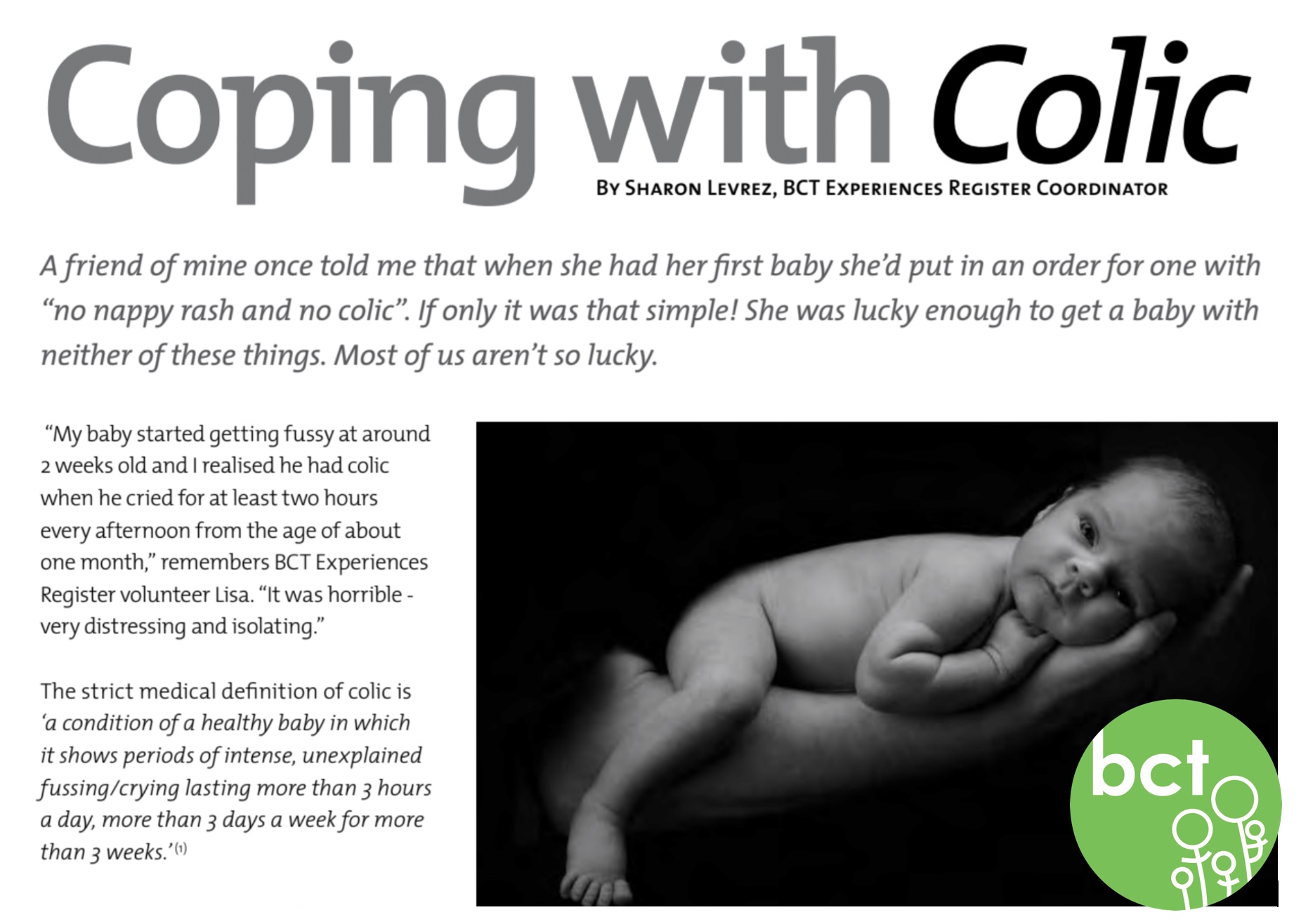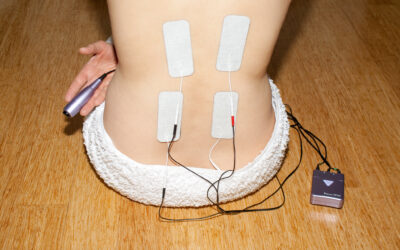A friend of mine once told me that when she had her first baby she’d put in an order for one with “no nappy rash and no colic”. If only it was that simple! She was lucky enough to get a baby with neither of these things. Most of us aren’t so lucky.
“My baby started getting fussy at around 2 weeks old and I realised he had colic when he cried for at least two hours every afternoon from the age of about one month,” remembers BCT Experiences Register volunteer Lisa. “It was horrible – very distressing and isolating.”
The strict medical definition of colic is ‘a condition of a healthy baby in which it shows periods of intense, unexplained fussing/crying lasting more than 3 hours a day, more than 3 days a week for more than 3 weeks.’ (1)
In French the word ‘colique’ is often used to refer to a bout of wind. So if your French paediatrician or midwife says your baby has ‘un peu de colique’ they may not be talking about what the English call ‘colic’. ‘Pleurs de nuit’ may be a more accurate translation. In Dutch, a colicky baby is called ‘een huilbaby’.
Colic is thought to affect about one in five babies. (2) It usually first appears when the baby is 3-4 weeks old and can last until about the age of 3 months. Common signs of colic include:
- Severe crying for several hours a day, often peaking in the evening or beginning of the night;
- Signs of abdominal pain;
- The baby’s face turns red or purple;
- The baby changes posture, clenches his/her fists, arches his/her back or draws his/her legs up to the stomach (3)
Colic should not be confused with reflux, which shares some of the same symptoms but is a more serious condition. As well as the above signs, a baby with reflux will often (but not always) bring up milk some time after his or her last feed and/or may sometimes appear to be ‘swallowing’ even when not drinking. If you are in any doubt, you should consult a doctor or paediatrician. Reflux can be treated quite effectively in most cases.
The symptoms and the severity of colic differ from case to case. Coping with a colicky baby can be very hard on the new mum and/or dad. It can sometimes make bonding with baby more difficult for parents. In extreme cases it can cause marital problems. Unfortunately, little is known about colic and it is poorly understood.
“As a first time mother you tend to question yourself if for whatever reason your baby doesn’t seem happy, besides the ‘normal’ amount of crying or other ‘normal’ discomforts,” says Raquel, another BCT volunteer. “It takes time to understand and accept that despite the lack of knowledge about its origins, [colic] is quite a common condition and that it is not in any case related to your parenting capabilities.”
COMMON CAUSES AND CURES
There are several potential causes of what we know as ‘colic’: an excess of stomach gas, excess of intestinal gas, neurological overload and a form of muscular colic (perhaps resulting from birth trauma). A study by Guy’s Hospital in the UK in 1999 has also linked it to lactose intolerance. (4)
According to the online information site Babycentre.co.uk, ‘We still don’t know why some babies cry so much more than others (NHS Choices 2010, PROGIDY 2007). Colic is just as common in breastfed and in formula-fed babies and affects girls and boys equally too.’ It adds ‘ (Deshpande 2009)Rest assured that … he’s not crying because of anything you’re doing or not doing (St James-Roberts 2008).’ (5)
There are as many potential treatments of colic as there are causes, perhaps more even. Doctors or health visitors may advise breastfeeding mums to avoid brassicas (cabbage, kale, and broccoli), fizzy water, caffeine, spicy foods, or acidic foods such as tomatoes and oranges. They may also propose a lactose/dairy free diet, in order to rule out that the baby is intolerant to cow’s milk. Another suggestion might be for the breastfeeding mother to drink fennel tea, or to give fennel or cumin oil drops to the baby, all of which are thought to ease the pain of excess gas. Taking care to burp your baby after each feed, or even during feeding if he seems uncomfortable, might also help.
Pharmacists can offer a range of solutions to colic, including Infacol, Babyfen (fennel drops)/Balyfen (cumin drops) and gripe water. Some parents think they help; some are convinced they do.
“I had instant success with gripe water, after 6 weeks of non-stop crying and trying massage, winding and fennel first,” says Sonya. “This was a massive relief.”
One fairly new supposed remedy for colic is a special way of changing the baby’s nappy. According to chiropractor Dr John Edwards, the traditional way of changing a nappy by lifting both legs to remove the old one and replace it with the new may actually contribute to colic. Instead, he suggests a rolling technique for babies who haven’t started crawling yet.
“When we use the legs for handles for a child who doesn’t have that secondary lumbar curve, we’re folding the spine at its peak, pushing the vertebra out of alignment where the nerve flow for the intestines comes out,” says Dr Edwards. “Holding the baby by her chest and rolling side to side keeps her spine in alignment and will help hold her adjustments so much better.” (6)
Others aren’t so sure all these cures work. Each baby is different. And there are many other, non-medical solutions parents can try: swaddling the baby; the colic hold (laying the baby across the forearm, stomach down, legs either side, and gently massaging the baby’s back); massaging the baby’s tummy; moving the baby’s legs in a bicycle motion; rocking the baby; even that special way to fix the baby’s nappy… You name it we’ve tried it.

“Try different things because every baby is different and there are probably multiple causes of colic,” says Lisa. Even if something doesn’t work, many parents find that simply trying different ways to alleviate colic can help them cope with it better. “At least you feel like you are doing something about it, changing tactics,” says Raquel.
BCT mum M agrees. “With a colicky baby I was willing to try anything that might help, so when a friend sent me an article describing the different nappy changing technique I thought I’d give it a go,” she says. “To be honest, I’m not sure if it made a difference in my case, but at least I felt I was doing something practical that might be making my daughter feel more comfortable.”
In the meantime, getting friends and family to take their turn at holding the baby and talking about how you feel to your doctor, your friends and your family can help ease the stress of looking after a baby with colic. So can focusing on the times when baby is not crying – some suggest keeping a picture of the peaceful , sleeping baby handy – or thinking of the future, when the colic period will have passed.
“We decided to take it in turns to walk around and cuddle her when it became too much,” says Helen, another BCT volunteer. “We would work in short shifts and when it wasn’t our turn, we would leave the room to get away from the assault on the ear drums. That helped us to stay more patient.”
A SILVER LINING?
It also helps to remember that this, like many other phases in a baby’s life, will pass. And when it does, you will look back on it differently. “Nothing else, either teething, potty-training, temper tantrums will ever, ever be that difficult again,” says Anna. “Once the colic period passes, you can really start to enjoy your baby and properly see the benefits of being a mother. In a funny way it probably helped the bonding process because I knew we did get through it, together.”
Finally, it seems there are no lasting effects of infant colic, at least not any we know about at present. According to the section on colic on the UK’s NHS website, “If your baby has colic, they may appear to be in distress. However, the condition is not harmful, and your baby will continue to feed and gain weight normally. There is no evidence that colic has any long-term effects on a baby’s health.” (7)
TEN COMMON ‘CURES’ FOR COLIC
- Swaddling
- Rocking
- Burping
- Massage
- Cumin drops
- Infacol
- Gripe water
- Avoid cabbage, broccoli and other brassicas
- Avoid fizzy drinks
- Limit caffeine and spicy foods
References
1 Wikipedia, http://en.wikipedia.org/wiki/Baby_colic,
2 NHS, http://www.nhs.uk/conditions/Colic/Pages/Introduction.aspx
3 Babycentre.co.uk, http://www.babycentre.co.uk/a77/colic
4 Wikipedia, http://en.wikipedia.org/wiki/Baby_colic,
5 Babycentre.co.uk, http://www.babycentre.co.uk/a77/colic
6 http://www.greenmedinfo.com/blog/best-diaper-changing-technique-newborns-reduce-colic, http://youtu.be/l9IDpEVkemM
7 NHS, http://www.nhs.uk/conditions/Colic/Pages/Introduction.aspx,
8 What to Expect, http://www.whattoexpect.com/first-year/photo-gallery/soothing-a-crying-baby.aspx#/slide-11
By Sharon Levrez, BCT Experiences Register Coordinator
This article was first published in the September/October 2013 edition of Small Talk magazine.






